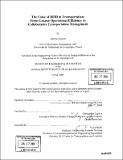The value of RFID in transportation : from greater operational efficiency to collaborative transportation management
Author(s)
Guitton, Antoine, 1963-
DownloadFull printable version (20.34Mb)
Alternative title
Value of Radio Frequency Identification in transportation
Other Contributors
Massachusetts Institute of Technology. Engineering Systems Division.
Advisor
Christopher Caplice.
Terms of use
Metadata
Show full item recordAbstract
This paper assesses the value of Radio Frequency Identification (RFID) in the transportation forecasting, planning, and execution processes for truckload (TL) and less than truckload (LTL) services. The results show that the value of RFID in transportation highly varies according to the sub-process and the player which are considered. The value in forecasting and planning is high for consignees and TL carriers, but low for shippers. For the execution process, the value is high for consignees, moderate for shippers, low for TL carriers and potentially high for LTL carriers. Fundamentally, the common value that RFID can bring to each player is labor cost reduction, obtained by automation of dock and clerical activities, and better service in tracking and reconciling, thanks to accurate and up-to-date information. The potential for dramatic improvement in transportation through RFID exists. Achieving such improvement will be possible only if information sharing rules, such as those espoused by Collaborative Transportation Management (CTM), and well formalized procedures are implemented. RFID can give to CTM invaluable "raw material", while CTM can enable the transportation players to fully take advantage of this material.
Description
Thesis (M. Eng. in Logistics)--Massachusetts Institute of Technology, Engineering Systems Division, 2004. "June 2004." Includes bibliographical references (leaves 112-115).
Date issued
2004Department
Massachusetts Institute of Technology. Engineering Systems DivisionPublisher
Massachusetts Institute of Technology
Keywords
Engineering Systems Division.